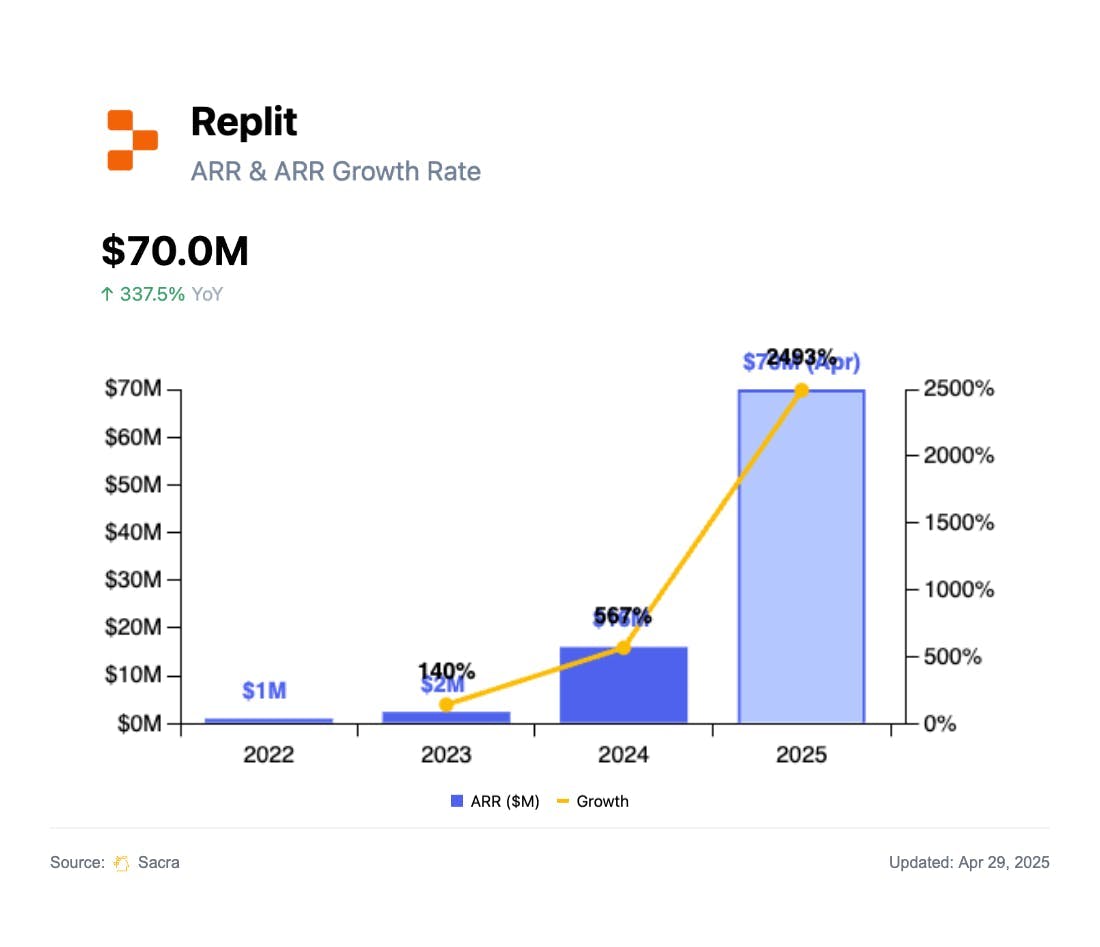Replit at $70M ARR
 Jan-Erik Asplund
Jan-Erik Asplund
TL;DR: Replit’s multiplayer browser IDE (2016) grew to tens of millions of users but with no clear path to monetization at scale. After the September 2024 launch of Replit Agent, revenue growth took off, with Sacra estimating that Replit hit $70M in ARR in April 2025, up 2,493% YoY from $2.7M in April 2024. For more, check out our full report and dataset.

Key points on Replit via Sacra AI:
- Following browser-based coding playgrounds like Codecademy (founded in 2011, acquired by Skillsoft in 2021 for $525M) which taught users how to code by letting them write code in the browser and see it run instantly, Replit launched in 2017 by taking the playground and turning it into a wedge into a full stack IDE, helping students learn to code by building fully-functioning apps instead of writing code snippets. Part of the “learn to code” movement circa the mid 2010s, Replit focused purely on software tooling for novice developers and SaaS as a business model—not creating courses or content (vs. educational startups like Codecademy) or employing instructors (vs. coding bootcamps like Lambda School).
- Hitting 20M total users by 2023, Replit’s ARR grew from just $1M in 2022 to $2.4M in 2023—reflecting the challenges of monetizing non-professional developers—with its progressive bundling of collaboration, databases & version control giving it inroads into the rising class of software creators (non-professional developers that monetize the ability to code) and professional use cases (e.g., interviewing). Replit spread via word of mouth on a consumer-style adoption curve through classrooms, coding clubs, Reddit threads, and YouTube tutorials as a lightweight way to experiment with code, powered by a generous free tier offering always-on hosting and only late in 2023 shifting toward monetization with per-seat Core ($20–25/month) and Teams ($35–40/month) plans.
- Revenue growth took off with the launch of Replit Agent in September 2024—layering an AI code generator on top of their existing IDE and deployment infra ala Vercel to enable one-click publishing—with Sacra estimating that Replit grew from $2.7M in April 2024 to $70M ARR in April 2025, up 2,493% YoY. Compare to “AI in your IDE” GitHub Copilot at ~$400M ARR as of November 2024, growing 281% YoY; AI-native IDEs Cursor at $200M ARR in March 2025, up from $100M at the end of 2024 and Codeium at $40M ARR in February 2025, up 1,500% YoY; AI app generators like Bolt.new at $40M ARR in February 2025 up from $20M at the end of 2024, and Lovable at $17M ARR, up from $7M at the end of 2024, and Vercel’s full-stack app generator PaaS at $172M ARR in February 2025, up 80% YoY.
For more, check out this other research from our platform:
- Vercel (dataset)
- Vibe coding index
- $172M/year Heroku of vibe coding
- Why OpenAI wants Windsurf
- Lovable vs Bolt.new vs Cursor
- Bolt.new at $40M ARR
- Claude Code vs. Cursor
- Cursor at $200M ARR
- Cursor at $100M ARR
- Lovable (dataset)
- Bolt.new (dataset)
- Anthropic (dataset)
- OpenAI (dataset)
- Scale (dataset)
- Cursor (dataset)













